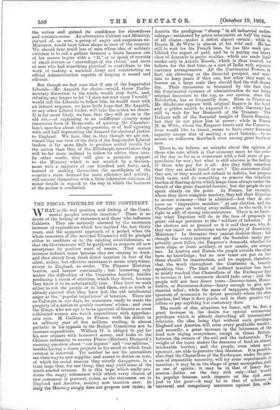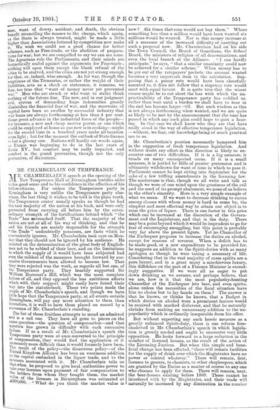THE FISCAL TROUBLES OF THE CONTINENT.
WHAT is the real position and feeling of the Conti- nental peoples towards taxation? There is no doubt of the feeling of statesmen and those who influence Cabinets. They are seriously alarmed by the enormous increase of expenditure which has marked, the last thirty years, and the apparent approach of a period when the whole resources of the national Treasuries will be pledged either to creditors or to the existing establishments, so that the Governments will be paralysed as respects all new enterprises by positive want of means. They cannot increase indirect taxes because they are ceasing to draw, and they shrink from fresh direct taxation in fear of the silent, sullen, but effective resistance it seems everywhere, except in England, to evoke. The Finance Ministers borrow, and borrow continually ; but borrowing only makes the difficulties of the Treasuries heavier, besides producing a storm of criticism, which they dread, because they know it to be substantially true. They have no wish either to rob the people or to load them, and so much is already exacted that they have lost the old intellectual anger at the "popular impatience" of taxation. There are no Calonnes in our days, no statesmen ready to waste the property of a nation to gratify courtiers' whims ; and even the Kings, who are apt to be as ignorant of finance as some cultivated women are, watch expenditure with apprehen- sive eyes. M. Caillaux, in France, with his deficit in an ordinary year of five millions sterling, is almost pathetic in his appeals to the Budget Committee not to increase expenditure. William II. is obliged to pay for his new cruisers with borrowed money, and looks to the Chinese indemnity to answer Prince (Herbert) Bismarck's sneering question about "our legions" and "our millions," besides having a dozen projects in his mind to which fresh revenue is essential. Yet neither he nor his counsellors see their way to new supplies, and assent to duties on corn, of which for social reasons they utterly disapprove, in a faint hope that, for one thing, they may yield some of the much-needed revenue. It is this hope which really pro- duces the angry vehemence with which every chance of new commerce is pursued, riches, as the statesmen see in England and. America, making new taxation easy. In Italy the Ministry simply dare not propose new, taxes; in Austria the prodigious " slump " in all industrial under. takings—estimated by grave economists at half the value of all shares—makes a deficit almost certain ; while in Russia M. de Witte is almost at his wits' end. He has still to wait for his French loan, he has this week pro- hibited the export of gold, and he is paying one heavy class of demands in paper roubles, which are made legal tender only in Asiatic Russia, which is thus treated, we believe for the first time, as a sort of India with separate currency arrangements. All the Continental Powers, in fact, are shivering at the financial prospect, and reso- lute to keep peace if they can, lest when they want to borrow on a large scale they should find, the well drawn dry. Their uneasiness is increased by the fact that the Continental systems of administration do not bring original financiers to the top, as our system, since the Revolution, has so frequently done. Even in France no Mr. Gladstone appears with original finance in his head and a golden mouth to expound it; while Germany has still to wait for her Bismarck of the Treasury. The Italians talk of the financial insight of Baron Sonnino, but they do not place him in power; while in Russia M. de Witte, whom the Emperor trusts and the Conserva- tives would like to knout, seems to have every financial capacity except that of making a good balance,—by no means an unknown drawback even among great business men.
There is, we believe, no mistake about the opinion of those who rule, which is that economy must be the order of the day so far as is consistent with a full state of pre- paredness for war ; but what is still obscure is the feeling of those who pay for it all. Are they fully conscious that they are much taxed or not ? The statesmen think they are, or they would not submit to deficits, but propose fresh taxes, and do something .to remove the vexatious burden of floating debts which keeps them always under the thumb of the great financial houses; but the people do not speak clearly on the point. In France, for example, where they have complete mastery, they tell their Deputies to secure economy—that is admitted—but they do not issue an "imperative mandate" at any election, and the Chamber goes on voting away millions, in the teeth, it is right to add, of strong remonstrances. There is no know- ing what Deputies will do in the face of proposals to grant old-age pensions to the "soldiers of industry." If the electors are so pressed as it is said they are, why do they not insist on reductions under penalty of dismissing Ministers? In Germany they cannot dismiss them ; but though the voters murmur and the Socialist ranks per- petually grow fuller, the Emperor's demands, whether for more ships, or fresh artillery, or new canals, are always met. In Austria and Russia the people outside the cities have no knowledge ; but no new taxes are put on lest there should be insurrection, and we suppose, therefore, that the *rah throughout the Continent is, broadly speaking, this. The limit of indirect taxation has been so nearly reached that Chancellors of the Exchequer fear to increase it lest commerce should fade away; and the people will not bear direct taxes—Income-taxes, House- duties, or Succession-duties—heavy enough to give sub- stantial relief; while the mass of taxpayers, though too ignorant of economics to detect precisely where the shoe pinches, feel that it does pinch, and in their passive way refuse to pay anything but customary dues. The result of this situation, we fancy, will be, first, a great increase in the desire for special commercial privileges which is already disturbing all international relations, the idea being that without such privileges England and America will seize every profitable market; and secondly, a great increase in the bitterness of the feud now raging everywhere, except in Great Britain, between the owners of the soil and the industrials. The weight of the taxes makes the dearness of food an almost intolerable burden ; and the people, even when most ignorant, are able to perceive that dearness. It is possible, also, that the Chancellors of the Exchequer, under the pres- sure of irresistible necessity, will try some experiments in taxation; it may be in the shape of great monopolies, suc,h as one of spirits; it may be in that of heavy Sue' cession - duties on the very rich only—that would be popular because such imposts on the rich seal: just to the poor—it may. be in that of schemes ot universal and compulsory insurance against fire, sick' ness, want of dowry, accident, and death, the obvious benefit reconciling the masses to the charge, which again, as the State is always trusted, might be made a little higher than Associations fettered by competition now make it. _ We wish we could see a good chance for better schemes, such as Free-trade, or the abolition of prepara- tions for war; but we are compelled to say we can see none. The Agrarians rule the Parliaments, and their minds are hermetically sealed against the arguments for Free-trade ; nothing will open them except the blank refusal of the cities to be starved, and the cities are not yet strong enough for that, or, indeed, wise .enough. As for war, though the emptiness of the.Treasuries, or rather the weight of their liabilities, acts- as a check on statesmen, it remains, we fear, too true that "want of money never yet prevented war." Men who are struck or who want to strike think nothing of the future fine. The new, and in our judgment evil, system of demanding huge indemnities greatly diminishes the financial fear of war, and the reservoirs of capital have been so swollen by successful industry that war loans are always forthcoming at less than 4 per cent. Some great advance in the industrial force of the people— for instance, a new and cheap motive power, or one which could be employed at home as gas now is in cooking—might for the second time in a hundred years make all taxation seem light ; but for the moment the outlook of State finance is but a gloomy one. Nations will hardly eat weeds again, as France was beginning to do in the last years of Louis XV., but comfort may be sadly impaired, and comfort is the grand preventive, though not the only preventive, of discontent.















































 Previous page
Previous page